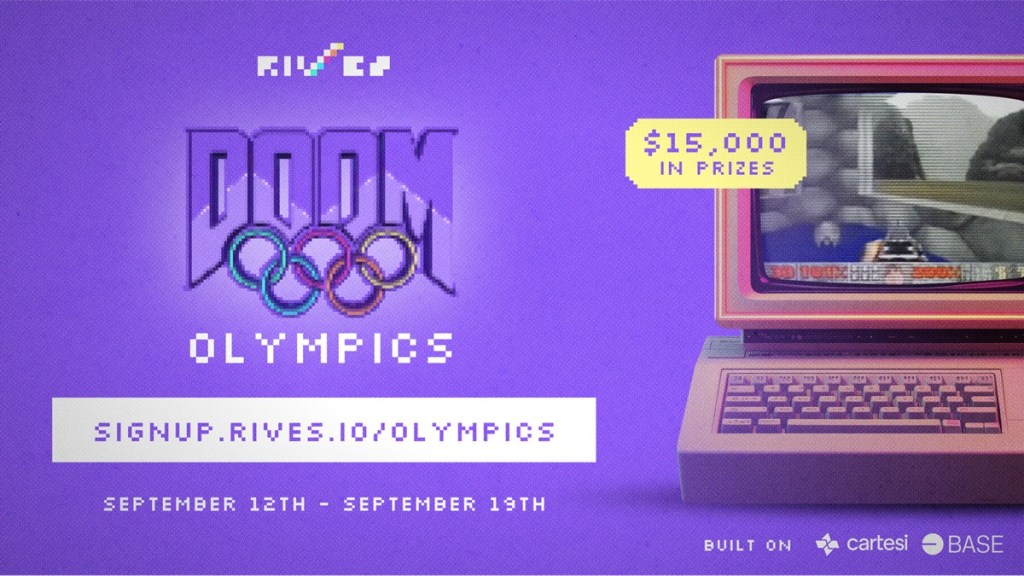Doom will run on the RIVES (RISC-V Verifiable Entertainment System), a blockchain gaming console built on Cartesi, a modular blockchain protocol.
RIVES is designed to run games and applications entirely on-chain, allowing everything from gameplay to interactions to be fully verifiable. This means it can prove scores, interactions, and progress in games like speedruns, all recorded on the blockchain.
And to demonstrate its capabilities, RIVES is launching the Doom Olympics, a seven-day competition starting September 12, designed to push the boundaries of what’s possible in blockchain gaming.
Unlike traditional Web2 platforms, RIVES allows for fully verifiable gameplay via “tapes” – interaction logs that ensure transparency and trust, as detailed in the linked article and thread.
Join us for GamesBeat Next!
GamesBeat Next brings together the next generation of gaming leaders. Join us October 28-29 in San Francisco! Take advantage of our buy one, get one free offer. Sale ends this Friday, August 16. Join us by signing up here.
Event Details

The Doom Olympics tournament offers a $15,000 prize pool to the top players across seven separate challenges. Players will experience Doom as the game engine and Freedoom build run in a fully verifiable manner on RIVES, a blockchain gaming console powered by Cartesi’s Rollup infrastructure, using a deterministic RISC-V virtual machine.
The competition will feature seven unique events: Lightning Run, Knuckle Crusher, Infallible Aim, Secret Master, Treasure Seeker, The Completionist, and Enemy Eradicator, each with its own scoring system and objectives. All gameplay is verifiable on-chain via RIVES, ensuring transparency, fairness, and a new form of modding with strict rule enforcement.
How it works
Players will compete by running their games locally in a browser within the Cartesi virtual machine.
Once the game is complete, it can be submitted to the RIVES rollup for verification, where nodes run the same deterministic VM to confirm the results. This process ensures that every move, score, and interaction is permanently recorded and fully verifiable. RIVES has six contributors, including co-founders Max Hatesuer and Carlo Fragni. RIVES has received a grant from Cartesi but has not yet raised funding.
The tournament is unique in that it relies equally on contributions from players and developers. Players generate verified gameplay tapes, while developers design the game cartridges. This innovative blend of gaming technology and blockchain not only improves community engagement, but also has the potential to attract new audiences, including speedrunners and cryptocurrency enthusiasts.
In an email to GamesBeat, Hatesuer said, “Unlike many Web3 games, which only use blockchain for assets, RIVES runs the entire game on-chain. This allows RIVES to verify gameplays without intermediaries. Every submitted Doom gameplay is replayed by nodes, which validates the score. This enables, among other things, canonical and persistent leaderboards, decentralized contests, and much more. Additionally, putting the logic and state of the game on-chain enables new forms of modding. The Doom Olympics consists of multiple custom game modes and rules that are run, verified, and enforced on RIVES.”
Asked if the company had a license from Bethesda, Hatesuer replied: “RIVES uses the Freedom version of the Doom engine. Both are open source.”
RIVES is a blockchain gaming console designed for creating, distributing and playing arcade-style games and programs. What sets RIVES apart from other gaming systems is that it runs entirely blockchain, meaning every game and program running on its emulator is fully verifiable, the company said.
RIVES empowers creators, whether developers or players, to fully express themselves. At the heart of RIVES are cartridges (standalone programs such as games) and tapes (verifiable recordings of gameplay, such as speedruns). These tapes can be replayed and shared, transforming gameplay into a meaningful and immutable part of the game itself.
RIVES is built on Cartesi Rollups, an application-specific Rollup infrastructure powered by a deterministic RISC-V virtual machine. This allows game developers to use traditional programming languages while preserving the unique properties of blockchain support.
RIVES provides decentralized canonical leaderboards and competitions. By running entirely on-chain, it ensures that game logic and state are permanent, verifiable, and can be seamlessly expanded upon, opening up new possibilities in gaming and beyond.
Source link

